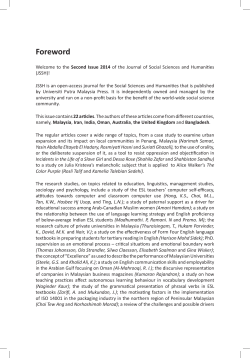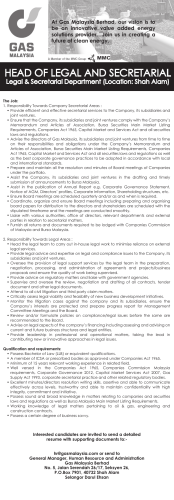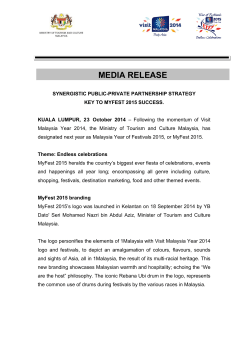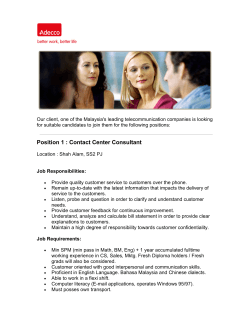
Module 4 – Sample Questions
Financial Planning Association of Malaysia Web Sample 2008 Module 4 – Sample Questions Q1. Three months ago, an investor converted RM100,000 into Singapore Dollars. The investor has decided to repatriate the funds now. What is his position now? Ringgit Malaysia per Singapore Dollar Exchange rate (three months ago) Current exchange rate A. B. C. D. : : 2.2000 2.0700 Loss RM5,909.09 Gain RM5,909.09 Loss RM13,000.00 Gain RM13,000.00 Answer: RM100,000 / 2.20 = S$45,454.55 S$45,454.55 x 2.07 = RM94,090.91 RM100,000 - RM94,090.91 = Loss RM5,909.09 Q2. A bank quotes the following fixed deposit rates: Tenor 3 months 6 months 12 months more than 12 months Interest rate per annum 3.25% 3.50% 4.25% 4.25% The interest rate cycle has just bottomed out and interest rates are now expected to rise. At which tenor would you advise your client to place a fixed deposit to take full advantage of this? A. B. C. D. 3 months. 6 months. 12 months. More than 12 months. Financial Planning Association of Malaysia Web Sample 2008 Q3. Interest is prohibited in all financial transactions in Islam. The Islamic terminology for interest is: A. B. C. D. Syariah. Riba. Mudharabah. Al-Dayn. Q4. Which of the following regarding Beta are false? I. II. III. IV. The Beta of the market is 1.0. A stock with Beta of 1.1 has below market risk. Beta measures systematic risk. Beta is a measure of return on risk-free investments. A. B. C. D. I, III II, III I, IV II, IV Q5. Calculate the simple return on an investment with the following data: P1 = RM3.24 P2 = RM3.96 Dividend = RM0.20 A. B. C. D. 22.2% 28.4% 23.2% 18.2% Answer: [(3.96 – 3.24) + 0.20]/3.24 = 28.4% Financial Planning Association of Malaysia Web Sample 2008 Q6. The basic distinction between a primary and a secondary market is: A. Proceeds from sales in a primary market go to the current owner of a security; proceeds in a secondary market go to the original owner. Primary markets involve direct dealings within regional exchanges. Only new securities are sold in a primary market; only outstanding securities are bought and sold in a secondary market. Primary markets deal exclusively in bonds, secondary markets deal primarily in common stocks. B. C. D. Q7. Calculate the ex-all price of the stock of Company A after a bonus and rights issue with details as follows: Price : Bonus Issue : Rights issue : RM4.00 2:1 1:1 at RM1.20 per share Note: The rights are after the bonus issue, and bonus shares are eligible for participation in the rights. A. B. C. D. RM 0.80 RM 1.20 RM 0.50 RM 1.27 Answer: Existing: RM4 x 1 = RM4 BI x2=0 RI RM1.2 x 3 = RM3.6 6 RM7.6 RM7.6/6 = RM1.27 Q8. Which of the following is a comparative stock valuation ratio? A. B. C. D. P/E ratio. Price-to-book ratio. Price-to-cash flow ratio. All of the above. Financial Planning Association of Malaysia Web Sample 2008 Q9. How much should you pay for a 10-year zero coupon bond with a face value of RM1,000 and time to maturity of 7 years, if the required yield to maturity is 12.0%? A. B. C. D. RM321.00 RM452.00 RM1,000.00 RM160.00 Answer: N=7 PMT = 0 FV = 1,000 I = 12% Compute PV = RM452 Q10. The main difference(s) between forward contracts and futures contract is/are that: A. B. C. D. Futures contracts are bought and sold on organized exchanges whereas forward contracts are normally negotiated with banks. Futures contracts are standardized while forward contracts are individually tailored. A and B. None of the above. Q11. Which is the main regulatory body governing unit trust funds? A. B. C. D. Bank Negara Malaysia. Bursa Malaysia. Securities Commission. Registrar of Companies. Financial Planning Association of Malaysia Web Sample 2008 Q12. Calculate the rate of return of the following fund with the information provided below: A. B. C. D. Price (31/12/05) Price (31/12/06) : : RM1.22 RM1.15 Dividend paid in year 2006 : 12 sen (5.7%) 4.3% 9.8% 4.1% Answer: [(1.15 – 1.22) + 0.12]/ 1.22 = 4.1% Q13. The following methods are used by valuers in determining the market value of a property, except: A. B. C. D. Cost approach. Comparative sales method. Tangible asset value method. Capitalization of rental method. Q14. The efficient frontier of risky assets may be defined as the portion of the investment opportunity set which ______________. A. B. C. D. Lies above the minimum variance portfolio. Represents the highest return to risk ratio. Includes portfolios with minimum risk. Includes portfolios with the highest returns. Q15. In ranking a portfolio performance, the Sharpe Index uses which measure of risk? A. B. C. D. Standard deviation. Variance. Beta. Correlation coefficient. Financial Planning Association of Malaysia Web Sample 2008 Q16. The return on a portfolio is _________________________. A. B. C. D. The sum of the returns of the individual securities. The value weighted sum of the returns of the individual securities. The value weighted sum of the variances of the returns. The value weighted sum of the co-variances of the returns. Q17. Which of the following are advantages of short-term investments? I. II. III. IV. A. B. C. D. High liquidity and low risk. Available from local financial institutions. Can be readily converted into cash with minimal inconvenience. Similar to market interest rates. I, II, III I, III, IV II, III, IV All of the above. Q18. You have just won the first prize in a competition which pays RM3,500 annually for 5 years. Nevertheless, the first payment will only be received 3 years from now. The current interest rate is 8%. However, it is predicted that the interest rate will decline to 6% by the beginning of year 3. What is the actual value of this prize today? A. B. C. D. RM11,703.68 RM12,405.90 RM12,671.90 RM15,627.87 Answer: 0 8% 1 3 2 3500 6% 4 5 3500 3500 6 7 3500 3500 8 Step 1: PVA due (at the beginning of year 3): n = 5; I = 6% PMT = $3500 PV = -15,627.87 Step 2: CF in year 0: n = 3; I = 8% PV = -12,405.9 FV = 15,627.87 Financial Planning Association of Malaysia Web Sample 2008 Q19. The probability distribution of a less risky expected return is more peaked than that of a riskier return. What shape would the probability distribution have for a completely certain return? A. B. Probability Probability Return Return C. D. Probability Probability Return Return Q20. Which of the following is not an assumption in accounting? A. B. C. D. Separate entity. Going concern or Continuity. Market value in determining the cost of asset. None of the above. Q21. An order placed which _______________. A. B. C. D. Limit order. Short sale. Market order. Stop loss. specifies the buy or sell price is a Financial Planning Association of Malaysia Web Sample 2008 Q22. ____________ are issued by companies whose earnings are closely linked to the general state of the economy or the general level of business activity. A. B. C. D. Speculative stocks. Defensive stocks. Cyclical stocks. Growth stocks. Q23. A company has a few ways to market its securities in a primary market. They are: I. II. III. IV. A. B. C. D. A Public Offering. A Rights Offering. A Private Placement. A Public Placement. I, II I, III I, II, III All of the above. Q24. The following are major reversal patterns in technical analysis except: A. B. C. D. Double top. Inverse head & shoulder. Saucer. Triangle. Q25. Which of the following statements regarding fixed income securities is/are false? I. II. III. IV. A. B. C. D. I II III III, IV The price of a bond increases when its yield to maturity decreases. As the duration of a bond increases, its sensitivity to a given change in interest rates increases. A normal yield curve is downward sloping. The higher the liquidity risk, the greater the required yield to maturity of a bond. Financial Planning Association of Malaysia Web Sample 2008 Q26. You have just bought a bond that matures in 10 years for the price of RM925. The bond has a face value of RM1,000 and an 8 percent annual coupon. What is the bond’s current yield? A. B. C. D. 8.65% 8.00% 8.33% 9.18% Answer: 80/925 = 8.65% Q27. Given the following unit trust quotes of Fund A, what is the effective service or sales charge? Fund A A. B. C. D. Buying RM0.96 Selling RM1.02 RNAV RM0.95 1.0% 7.4% 6.3% 8.2% Answer: 1.02 – 0.95 = 0.07 0.07/0.95 = 7.4% Q28. Studies on unit trust funds’ return and risk performance have found that _____________. A. B. C. D. Risk and return performance is not consistent over time. Risk and return performance is consistent over time. Risk performance is consistent over time but return performance is not consistent over time. Risk performance is not consistent over time but return performance is consistent over time. Financial Planning Association of Malaysia Web Sample 2008 Q29. Which of the following are reasons for a purchaser to be cautious in using the comparative method of valuing properties? I. II. III. IV. A. B. C. D. The discount rate used may not be appropriate for the type of property. The property cycle may be at a peak. It bears no relation to the cost of construction of the property. It is difficult to determine the after tax cash flow. I, II II, III III, IV I, IV Q30. In real estate, ownership rights can be transferred to a different person in the form of a _______________. A. B. C. D. Reversion or remainder. Freehold or leasehold. Title or deed. None of the above. ∼∼∼∼∼∼∼∼∼∼ End of Sample Questions ∼∼∼∼∼∼∼∼∼∼
© Copyright 2026











